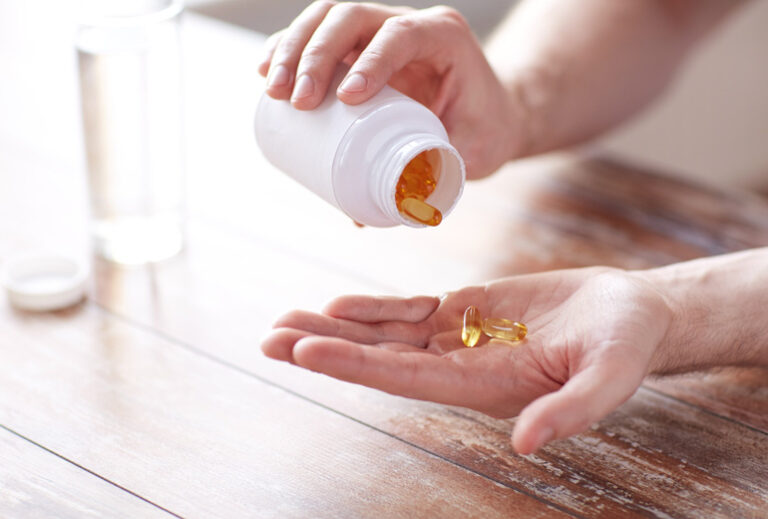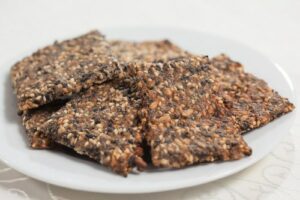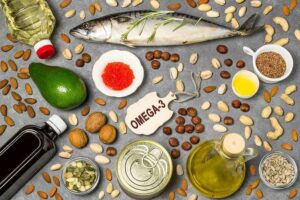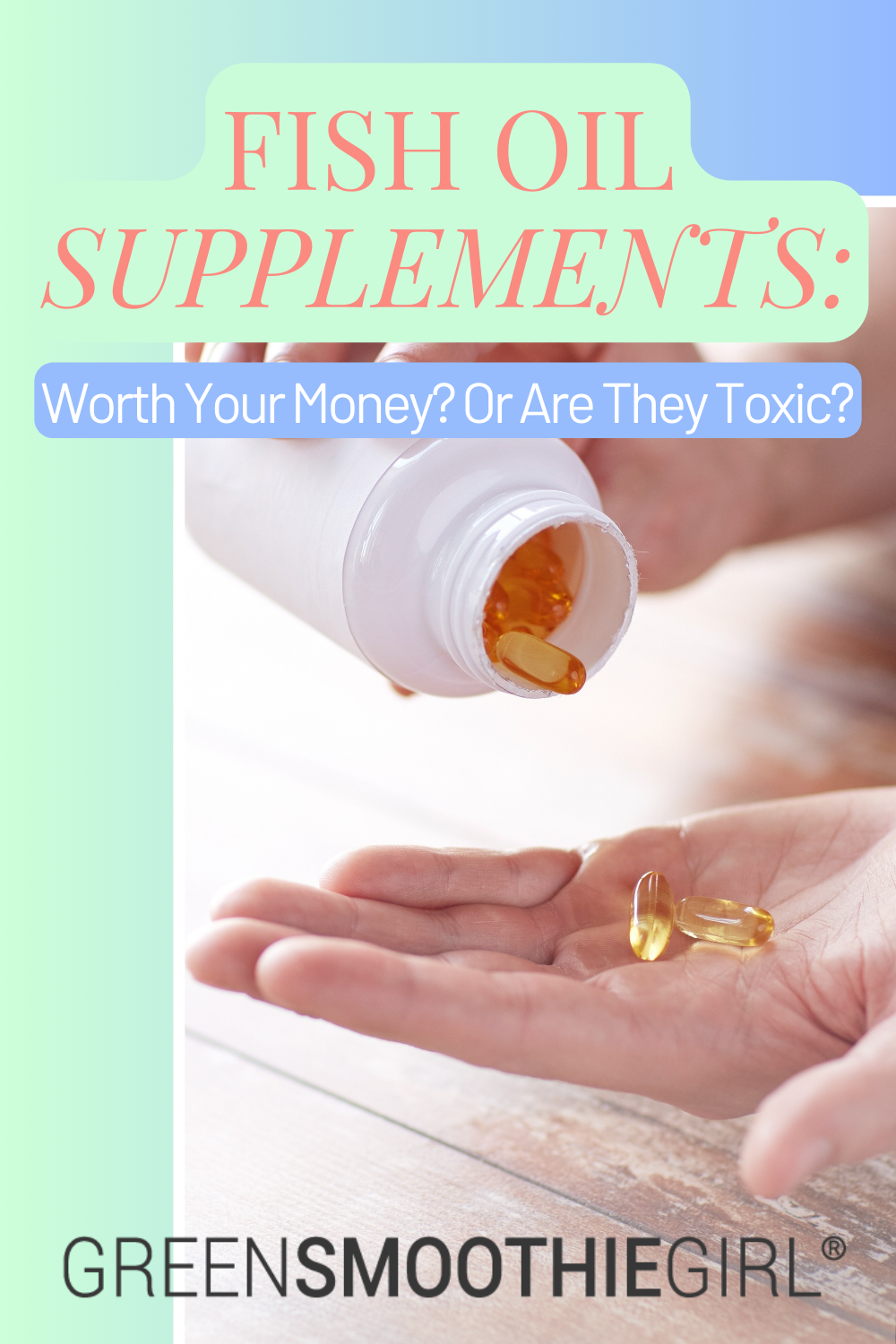Fish Oil Supplements: Worth Your Money? Or Are They Toxic?

Dear GreenSmoothieGirl: Am I wasting my money on fish oil supplements?
Essential fatty acids (EFAs), also called “omegas,” are excellent for neurological and cardiovascular health. We must get them from food because our bodies don’t produce them from other materials.
If you ask most Americans how they get their omega-3 benefits, you’ll likely be told “fish oil pills.”
But fish oil pills are NOT the best way to get your omegas!
What you’ll discover in this article:
- Is fish oil good for you?
- The best whole-food sources of omegas
- Why isn’t everyone sprouting their flax?
- Does fish oil prevent cardiovascular disease?
- Does fish oil prevent prostate cancer?
- Fish oil gone bad
- How to get your essential omegas
- Arguments for and against fish for omegas
- The omega 6/omega 3 balance ratio
- Conclusions on whether fish oil is good for you
Is Fish Oil Good for You?
Fish oil pills are the #1 supplement in America.
Like lemmings rushing off the cliff, we’re all swallowing billions of dollars in rancid, “purified,” deodorized, processed oils that do us no good, according to the research.1
It’s such a lucrative business that some of the world's waterways are being severely depleted. Actually, “fish oil” is extracted from the throwaway parts of various fish.
Krill oil became popular because people could collect it like whales do. (Too bad for the whales, though.) However, one issue is that the waterways are polluted with mercury, microplastics, and many other toxins.
And guess what: A study published in the Journal of the National Cancer Institute shows a dramatically higher risk of developing prostate cancer if you eat fish oil.2
It was sold to us as a solution to heart disease. But meta-analyses, reviewing hundreds of published studies, show that Americans taking billions of dollars a year of these supplements hasn’t prevented any cardiovascular disease.
The Best Whole-Food Source of Omegas
The way I get essential fatty acids in my diet every day is to put a scoop of organic Sprouted Flax in my green smoothies. (It’s also great in cookies, baked goods, on top of cereal, yogurt, or lots of other ways to eat it.)
[Related: 15 Ways to Use Sprouted Flaxseed]
Flax has long been treasured as the best plant-based source of omega-3 fatty acids, and many people purchase flax in seed form. (This is the whole food, versus oil and other derivative processed products.)
But the BEST way to get omegas from flax is by sprouting it.
Why is sprouted flax better than flaxseed or flax oil?
Flaxseed, even when milled, is poorly absorbed unless sprouted. Seeds have natural enzyme inhibitors to prevent digestion.
Sprouting eliminates these inhibitors, allowing the nutrients to become available for absorption, and creating a living superfood!
Plus, there are more benefits to sprouting flaxseed:
- Sprouting stabilizes the abundant essential fatty acids in the seed, which not only increases absorption but also decreases the chances of rancidity. Unlike flax oil, which must be refrigerated and used quickly, flax that is sprouted and ground can have a shelf life of many years!
- Sprouting biologically activates the seed, unlocking and greatly increasing its vitamins, minerals, proteins, and other micronutrients, transforming it into a living superfood. On average, vitamins increase by 500% compared to non-sprouted flaxseed. Vitamin C and vitamin E can increase more than 900% when sprouted.
- Sprouted flaxseed has double the antioxidant value of non-sprouted flaxseed.
- Sprouting increases flax’s soluble-to-insoluble fiber ratio to a very rare 50/50, resulting in enhanced nutrient absorption, reduced food cravings, and sustained energy while providing gut-healthy bulk for digestive tract support.
- Lignans can increase as much as 14% during sprouting. Lignans have outstanding antioxidant properties and may help regulate hormone levels, support the immune system, and reduce the stress hormone cortisol.
Why Isn’t Everyone Sprouting Their Flax?

These yummy dehydrated crackers made with Sprouted Flax are one of my very favorite snacks to take on the road!
Flax seeds (and other “mucilaginous” seeds like chia) are notoriously difficult to sprout and use because they can become gummy if soaked too long.
I’ve done it to make my Sprouted Flax Crackers, so I know they can be tricky to work with.
That’s why I developed an Organic Sprouted Flax product that is germinated, gently dried to preserve the live nutrients, and then cold-ground into a rich powder that is easy to use.
This product is fresh, sprouted, plant-based omegas, with all the vitamins, minerals, protein, and fiber in whole food – not rancid, deodorized capsules of cooked fish oil that have been in the supply chain for an average of nine months when you swallow them.
I also created our organic Sprouted Tri-Omega product to include the benefits of sprouted chia and broccoli seeds,3 which provide optimal amounts of those tricky-to-get, all-important Essential Fatty Acids, but in whole-food form.
It’s just organic, sprouted ground flax seed, chia seed, and broccoli seed! That’s all.
Either of these very special omega-rich products is a great addition to your green smoothie, your homemade granola, baked goods, and more.
They are an easy way to store living, sprouted foods against the future, and against emergencies. I recommend having all three – flax, chia, and broccoli seeds – on hand. You can get them with our Sprouted Flax and our Sprouted Tri-Omega.
Does Fish Oil Prevent Cardiovascular Disease?
Supplementation with fish oil did not reduce the risk of cardiovascular events such as heart attacks, strokes, or congestive heart failure, according to a meta-analysis that reviewed over 1,000 articles and included over 20,000 patients with a history of cardiovascular disease.4
Additionally, researchers concluded that taking omega-3 fatty acids, primarily through supplements, had no effect on the risk of coronary heart disease or strokes, according to a systematic review that combined 79 trials involving 112,059 people with and without cardiovascular disease.5
That’s two major reviews of the published literature that defy the 30+ year claim that we should take literally billions of dollars’ worth of fish oil pills, to avoid heart disease.
Does Fish Oil Prevent Prostate Cancer?
On the contrary, fish-derived omega-3 fatty acids may actually have the opposite effect.
Participants with the highest concentrations of fish-derived omega-3s in their blood had a 43% higher risk of developing prostate cancer, as shown in a study published in the Journal of the National Cancer Institute.6
Researchers believe the fatty acid may cause oxidative damage to cells' DNA, creating a fertile ground for cancer.
Another meta-analysis that included 44 studies concluded that “current evidence is insufficient to suggest a relationship between fish-derived omega-3 fatty acid and risk of prostate cancer.”7
So, just what went wrong with what seemed to be the supplement of the century?
Fish Oil Gone Bad
There are several reasons that fish oil is not an ideal source of crucial nutrients.
Let’s take a look at a few of the issues fish oil faces:
PCBs
Polychlorinated biphenyls (PCBs) were banned in the U.S. in 1979 after they were proven to be neurotoxins, carcinogens, and endocrine disruptors.
Unfortunately, this ban came after 1.5 billion pounds of PCBs were used to make appliances, refrigerators, paints, plastic, and rubber products.
PCBs are slow to decompose (they take centuries to break down, if ever) and can now be found throughout the world in the air, water, soil … and fish oil.
A study reported in the Journal of Nutrition found that rats, after 9 weeks of consuming fish oil, had accumulated PCBs and OCs (organochlorine pesticides) in their fat tissue.8
A California lawsuit resulted in independent lab tests on five popular fish oil supplements.9 All had 10 times the state limit of PCPs.
Organochlorine Pesticides (OCs)
This class of chlorine-containing organic pollutants includes DDT. These compounds are proven endocrine disruptors and pose a substantial carcinogenic threat.
When researchers collected 30 samples of fish oil and analyzed them for PCBs and OCs, each sample was found to contain detectable residues of both chemicals.10
Dioxins

Dioxins are highly toxic and can cause reproductive and developmental problems, damage the immune system, interfere with hormones, and may also cause cancer.
This highly toxic compound is a byproduct of herbicide production and paper bleaching. It is also produced in burning processes, such as commercial waste incineration and backyard burning.
It is considered a serious and persistent environmental pollutant that does not break down easily.
In fact, once dioxin is in the body, it can take anywhere from 7 to 11 years to fall to half of its original level.
Because dioxins are stored in animal fats, over 90% of our exposure comes through the food we eat, namely animal products such as dairy, meat, fish, and shellfish.11
Rancidity
Did you know that it can take two or more years for fish oil to go from catch to when you finally swallow it?12
That means the supplement you’re picking up from the retail shelf may well be rancid, and if it’s been sitting on your own shelf for a while, it most certainly is.
Rancidity happens when the oil oxidizes, and oxidized fish oil actually contributes to many of the diseases that people take fish oil to prevent or treat. Oxidized fats increase the risk of hardened arteries, which in turn increases the risk of a heart attack or stroke.
Researchers divided women in a study into three groups: one group received less oxidized omega-3 capsules, another consumed highly oxidized oil, and the final control group received no supplement.13
When triglyceride and cholesterol levels were checked 30 days later, only those women who received the less oxidized oil had reduced levels. Those who took the higher oxidized supplement actually had increased levels of cholesterol.
How to Get Your Essential Omegas

You can find omega-3 in plenty of food other than fish oil.
As with most nutrients, I recommend getting your essential fatty acids from whole foods.
Sprouted flax seeds, chia seeds, walnuts, and pumpkin seeds are all good vegetarian sources of alpha-linolenic acid, a short-chain omega-3 fatty acid that the body then converts to the longer–chain fatty acids, EPA and DHA.
Algae is also becoming popular as an alternative source of omega-3s. This vegetable from the sea contains the EPA and DHA, which offer the most potent anti-inflammatory effects.
Fun Fact: Did you know that fish are rich in omega-3 fatty acids because they eat algae? Humans can get their omega-3s from the same source animals do.
Algae For EPA And DHA
Spirulina and chlorella are particularly good sources of algae. Kelp, dulse, and nori, all multicellular algae known as seaweed, are easy to incorporate into your daily diet.
Our Organic Superfood Complete Meal protein is an easy way to include spirulina and chlorella in your diet. Add it to green smoothies, oatmeal, yogurt, and more.
Arguments For And Against Fish For Omegas
Another option you may consider is eating wild-caught, cold-water fatty fish from the cleaner ocean waterways.
In addition to omega-3 fats, these fish have additional nutrients including vitamins, minerals, and aminos, all working together as a synergistic whole. The nutrients support each other, increasing the absorption rate and other benefits that come from eating whole foods rather than isolated, processed extractions.
On a personal level, I have stopped eating fish altogether. I’ve read one too many articles about various types of fish that we once thought were healthy being found with everything from Japanese tapeworms to cocaine. And these are the wild fish caught in the cleanest environments.
One such study, published by the Centers for Disease Control, reported that the Japanese broad tapeworm had been found in wild salmon caught in Alaska. Because of this, researchers believe that salmon caught anywhere along the Pacific coast of North America may be infected.14
Another study conducted at Puget Sound found 81 drugs and personal-care items, including cocaine, Prozac, and Lipitor, in the flesh of fresh-caught salmon.15
Flax for Omegas
Flax is an easy, whole-food source of essential fatty acids that also contains lignans, fiber, protein, and a host of other compounds that contribute to good health.
Flax oil has the same issues with rancidity as fish oil because omegas are very delicate compounds that degrade quickly.
Even freshly ground flax must be used quickly to prevent oxidation, so my favorite way to benefit from flax is in sprouted form (which stabilizes the essential fatty acids), then gently dried (to preserve the enzymes) and ground for ease of use.
I use a scoop of Tri-Omega in my daily blender batch of green smoothies. It’s organic, sprouted broccoli, chia, and flaxseed, which covers the bases well.
The Omega-6/Omega-3 Ratio Balance
With all the discussion about the benefits derived from omega-3 fatty acids, it’s easy to forget a crucial consideration: the balance between omega-6 and omega-3 fatty acids.
Studies show that the best results for disease prevention are achieved by a ratio of 1:1 and 3:1 omega 6 to omega 3. In Japan, where people have the longest life spans and the lowest rates of heart disease, their ratio is 1.5:1.
In the U.S., we are generally closer to 16:1.16
Why the difference? Our culture eats processed, prepackaged, and fast foods made with cheap vegetable oils high in omega-6 oils, such as soy, corn, cottonseed, sunflower, and safflower. The traditional Japanese diet, on the other hand, is low in these types of vegetable oils and higher in vegetables and fish.
Getting back into balance doesn’t just require dosing up on omega-3 fatty acids, it also requires cutting back on omega-6.
We do this by returning to the diet nature intended – a plant-based, whole-foods diet. Ditch the vegetable oil and fried foods. Throw out the boxes and head to the organic produce aisle.
Conclusions On Whether Fish Oil Is Good For You
- Millions of Americans are spending a billion dollars a year on one of the most popular supplements that doctors have recommended for over 30 years—fish oil.
- Consumers take fish oil supplements for their high omega-3 content, which has been linked to numerous health benefits, including protecting the cardiovascular systems and reducing the chances of cancer or arthritis.
- Fish oil supplements have been called the “sewer of the sea,” because of the contaminants and toxins found in tested samples.
- Most fish oils are not clear-colored and smell fishy, meaning that they have gone rancid.
- Rancid oil can produce the very same ailments consumers are trying to treat, such as high cholesterol.
- Algae, sprouted flax seeds, chia seeds, walnuts, and pumpkin seeds are good alternatives to fish oil.
- The bottom line is the importance of keeping your omega-3 and omega-6 fatty acids in balance by eating a whole food, mostly plant-based diet.

Disclosure: This post may contain affiliate links that help support the GSG mission without costing you extra. I recommend only companies and products that I use myself.

References
- Greene, J., Ashburn, S. M., Razzouk, L., & Smith, D. A. (2013). Fish oils, coronary heart disease, and the environment. American journal of public health, 103(9), 1568–1576. https://doi.org/10.2105/AJPH.2012.300959
- Chavarro, J. E., Stampfer, M. J., Li, H., Campos, H., Kurth, T., & Ma, J. (2007). A prospective study of polyunsaturated fatty acid levels in blood and prostate cancer risk. Cancer epidemiology, biomarkers & prevention: a publication of the American Association for Cancer Research, cosponsored by the American Society of Preventive Oncology. https://doi.org/10.1158/1055-9965.EPI-06-1033
- Fahey, J. W., Zhang, Y., & Talalay, P. (1997). Broccoli sprouts: an exceptionally rich source of inducers of enzymes that protect against chemical carcinogens. Proceedings of the National Academy of Sciences of the United States of America. https://doi.org/10.1073/pnas.94.19.10367
- Kwak SM, Myung S, Lee YJ, Seo HG, Korean Meta-analysis Study Group FT. Efficacy of Omega-3 Fatty Acid Supplements (Eicosapentaenoic Acid and Docosahexaenoic Acid) in the Secondary Prevention of Cardiovascular Disease: A Meta-analysis of Randomized, Double-blind, Placebo-Controlled Trials. Arch Intern Med. 2012;172(9):686–694. doi:10.1001/archinternmed.2012.262
- Abdelhamid AS, Brown TJ, Brainard JS, Biswas P, Thorpe GC, Moore HJ, Deane KHO, AlAbdulghafoor FK, Summerbell CD, Worthington HV, Song F, Hooper L. Omega‐3 fatty acids for the primary and secondary prevention of cardiovascular disease. Cochrane Database of Systematic Reviews 2018, Issue 7. Art. No.: CD003177. DOI: 10.1002/14651858.CD003177.pub3.
- Groden, Claire. Hold the Salmon: omega-3 fatty acids linked to higher risk of cancer. CNN. https://www.cnn.com/2013/07/12/health/salmon-cancer-time/index.html
- Aucoin, M., Cooley, K., Knee, C., Fritz, H., Balneaves, L. G., Breau, R., Fergusson, D., Skidmore, B., Wong, R., & Seely, D. (2017). Fish-Derived Omega-3 Fatty Acids and Prostate Cancer: A Systematic Review. Integrative cancer therapies, 16(1), 32–62. https://doi.org/10.1177/1534735416656052
- Hong, M. Y., Lumibao, J., Mistry, P., Saleh, R., & Hoh, E. (2015). Fish Oil Contaminated with Persistent Organic Pollutants Reduces Antioxidant Capacity and Induces Oxidative Stress without Affecting Its Capacity to Lower Lipid Concentrations and Systemic Inflammation in Rats. The Journal of Nutrition, 145(5), 939–944. https://doi.org/10.3945/jn.114.206607
- Charles, Patricia. Some Healthy Fish Oil Supplements Come With Serious Chemical Contamination. Press Release.
- Rawn, Dorothea, et al. Persistent Organic Pollutants in Fish Oil Supplements on the Canadian Market: Polychlorinated Biphenyls and Organochlorine Insecticides. Journal of Food Science.
- Dioxins. World Health Organization. https://www.who.int/en/news-room/fact-sheets/detail/dioxins-and-their-effects-on-human-health
- Gardner. A. (2024). The 11 Best Fish Oil Supplements. GeneFood. https://www.mygenefood.com/blog/find-best-omega-3-fish-oil-supplements
- García-Hernández, V. M., Gallar, M., Sánchez-Soriano, J., Micol, V., Roche, E., & García-García, E. (2013). Effect of omega-3 dietary supplements with different oxidation levels in the lipidic profile of women: a randomized controlled trial. International journal of food sciences and nutrition, 64(8), 993–1000. https://doi.org/10.3109/09637486.2013.812619
- Scutti, S. (2017, January 11). US salmon may carry Japanese tapeworm, scientists say. CNN. https://www.cnn.com/2017/01/11/health/salmon-tapeworm-food-study/index.html
- Meador, J. P., Yeh, A., Young, G., & Gallagher, E. P. (2016). Contaminants of emerging concern in a large temperate estuary. Environmental pollution (Barking, Essex : 1987), 213, 254–267. https://doi.org/10.1016/j.envpol.2016.01.088
- Simopoulos A. P. (2002). The importance of the ratio of omega-6/omega-3 essential fatty acids. Biomedicine & Pharmacotherapy, 56(8), 365–379. https://doi.org/10.1016/s0753-3322(02)00253-6
Posted in: Health Concerns, Natural Products, Preparedness, Preventive Care, Supplements, Tools & Products, Whole Food
















No comments found, but you can be our first!